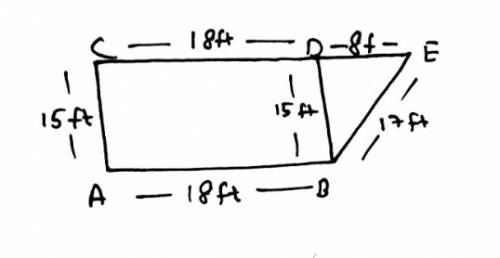
Mathematics, 04.07.2019 14:30, tzartiger12
Find the perimeter and area of the polygon shown below. the polygon is a trapezoid made up of a rectangle and a right triangle. the rectangle is 18 feet long and 15 feet wide. the right triangle joins the rectangle at a side that is 15 feet wide, and this is the height of the triangle. the base of the triangle is 8 feet and the hypotenuse is 17 feet.

Answers: 1
Other questions on the subject: Mathematics

Mathematics, 21.06.2019 18:00, alyssahomeworkneeds
When the ball has traveled a distance of
Answers: 1

Mathematics, 21.06.2019 20:30, jthollis1348
Which expression is equivalent to (4 +6i)^2? ? -20 + 48i 8 + 12i 16 - 36i 20 + 48i
Answers: 1

Mathematics, 21.06.2019 23:30, annsmith66
Annabelle's homework is 75% it took her three hours how long should she estimate it will take her to complete her homework.
Answers: 1

Mathematics, 22.06.2019 01:00, Bryson2148
Find the rate of change for the situation. you run 7 miles in one hour and 21 miles in three hours.
Answers: 1
Do you know the correct answer?
Find the perimeter and area of the polygon shown below. the polygon is a trapezoid made up of a rect...
Questions in other subjects:







Biology, 05.05.2020 00:02


Advanced Placement (AP), 05.05.2020 00:02





![=[(18) \times (15)] + [(\frac{1}{2}) \times (8) \times (15)]](/tpl/images/0050/5402/9a48a.png)
![=270 + [(\frac{8}{2}) \times (15)]](/tpl/images/0050/5402/54487.png)
![=270 + [4 \times (15)]](/tpl/images/0050/5402/555c6.png)








